Most often, self-doubt is discussed in the negative context of low self-esteem and lack of success. But think for a moment what would happen if we hadn’t the slightest trace of self-criticism. We would be so happy with who we are that we would probably stagnate in the same spot for ages!
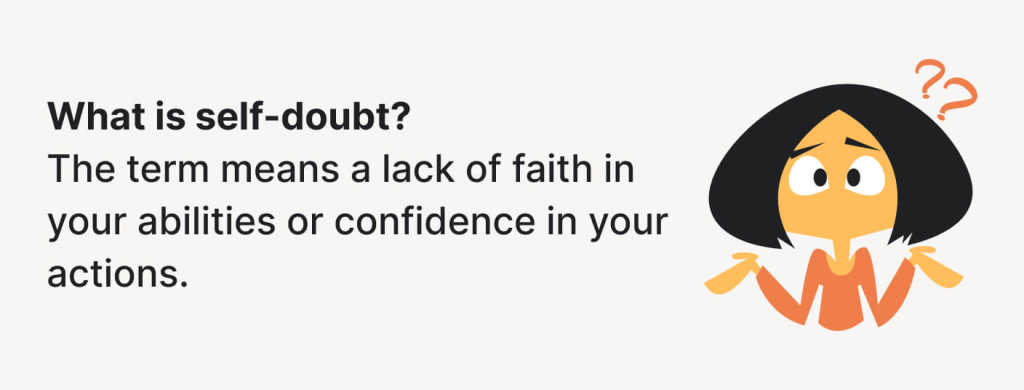
So, in a way, self-doubt is the engine of progress because it gives us an objective picture of our abilities. Moreover, it allows us to glimpse how other people perceive us as well.
For example:
- Students need a healthy share of self-doubt to choose the right university.
- Parents need it to track how well they bring up their kids.
- Employees use self-doubt to anticipate their manager’s remarks and work harder and better.
But what happens when your self-doubt gets out of control?
This article explores the causes, signs, and ways to overcome excessive self-criticism. You will learn to differentiate between healthy and unhealthy approaches and understand when, how, and why self-doubt can become a problem for you as a student.
🤔 What Is Self-Doubt?
According to the Merriam-Webster Dictionary, self-doubt is a lack of faith in your abilities or confidence in your actions. The term was used for the first time in 1847, just nine years before the birth of the Father of Psychoanalysis, Sigmund Freud. Was that not a sign of a deepened interest in the complicated ways of human psychology?
From a more practical point of view, if you have a lot of self-doubts, your self-esteem is unstable.
What does this mean?
One day you may feel like your performance is excellent, but the next day, you hesitate to do even the most basic actions in public.
In other words:
You don’t have a true-to-life image of your competence level, which instead fluctuates depending on various external factors.
Here’s a brief self-check to know if this article may be helpful to you.
- Do you feel unsure when thinking about your learning abilities or public-speaking skills?
- Would you prefer to be more confident about the outcomes of your current efforts?
- Are you uncertain about your competencies and if they are as good as those of your peers?
Research has shown that higher self-doubt creates low task performance and engagement. But as long as the experiment participants were flexible and believed in the power of education, their self-doubt lost that deteriorative effect. They even showed better academic results than people with low self-doubt.
Thus, researchers established that there is a critical breaking point in self-criticism. After reaching that level, people become less productive and more inclined to give up tasks without trying.
Healthy Vs. Unhealthy Self-Doubt
Self-doubt has two faces, like the two sides of a coin. If it renders you helpless and depressive, it is useless. But a reasonable amount of criticism is often helpful.
We can speak of healthy self-doubt when it helps us recognize that there is no absolute right or wrong. Instead, we start to challenge ourselves and reflect inward. This process entails a certain level of humility, which is highly beneficial when used in moderation.
Healthy self-doubt can improve:
- Your romantic and friendly relationships;
- Your academic progress;
- Your family situation;
- Your physical attractiveness.
Unfortunately, our society usually appreciates everything that goes beyond its limits. Nowadays, most people feel they have to be extraordinary to get noticed. In this way, self-doubt can become like “mental chewing gum.” Sometimes it only brings pain and distraction from the things that matter.
Unhealthy self-doubt stands between you and your achievements. It is a glass ceiling you can see through but cannot penetrate. Small failures get exaggerated, and achievements seem meaningless.
So how can you tell one from another?
Signs of Unhealthy Self-Doubt
- Feeling worthless
- Having a loud inner critic
- Anxiety
- Constant self-criticism
- Need for constant approval
- People-pleasing habits
- Insecurities in relationships (avoidant attachment or insecure attachment)
- Low self-esteem
- Stage fright
- Being “busy” all the time
- Imposter syndrome
👿 3 Main Causes of Self-Doubt
How do such habits emerge? Who makes us question ourselves? We will discover a way to gain confidence by finding the answers to these questions.
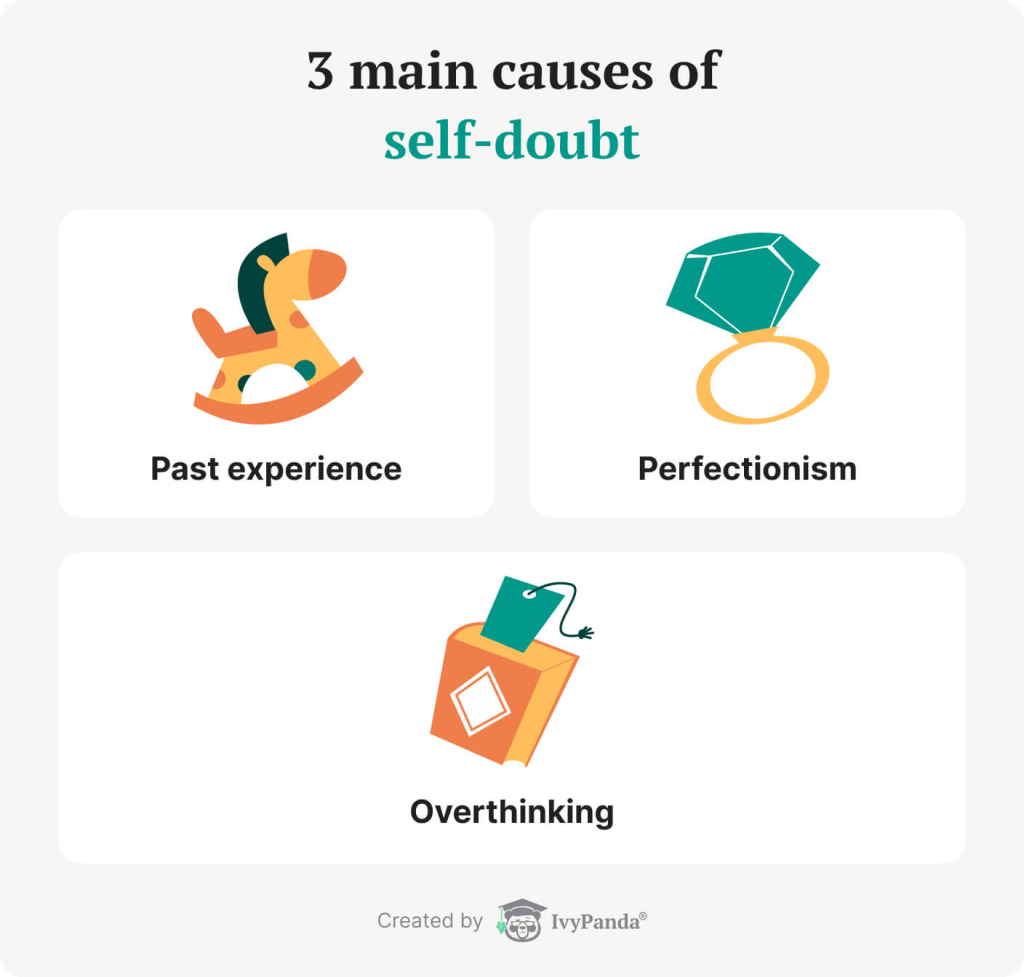
Past Experience
Traumatic events during childhood can cause self-doubt. The brain is still developing, and it either learns healthy ways of living through stress or self-destructive strategies. A study of sexual abuse victims has confirmed this fact.
Painful experiences lead the brain to a fight-or-flight response. The amygdala links the memories of dangerous situations to emotions you experienced parallel to the threat. As a result, when you get the same feeling again, your brain signals that it’s time to “feel” danger.
Although the safety response has helped humanity survive, it can also affect a person’s self-image. This mechanism perpetuates the vicious cycle of fight-or-flight responses, making the person feel hopeless or worthless.
Abraham Maslow’s Pyramid of Needs helps us understand the mechanism of trauma and how it affects our self-image.
There are 5 principal human needs:
- Physiological
- Safety
- Belonging and love
- Esteem
- Self-actualization
Each subsequent level of needs is impossible without satisfying the previous one. It sounds intuitive, but have you considered that the absence of basic physical needs entails trauma and, therefore, low self-esteem?
Perfectionism
Perfectionism reinforces self-doubt. You procrastinate on a task merely because you’re unsure you’ll manage it well enough. However, you’ll never know if you don’t try!
Perfectionism goes hand-in-hand with imposter syndrome. The latter describes the situation where successful people think they are unworthy of their achievements. They may have been traumatized by past failures or merely think they are not good enough to have gotten so far in life.
Perfectionism paralyzes you out of the fear you cannot make something as perfect as you envisage.
Overthinking
Overthinking destroys you from the inside. It makes you imagine everything that can go wrong in full detail. But worst-case scenarios are very unlikely and, in most cases, exist only in your head.
Anxious people underestimate their ability to handle challenges. They panic before a potential crisis, causing unnecessary stress and wasting their mental power. This reinforces their self-doubt and leads to progressively more negative thoughts.
🎓 Why Is Self-Doubt a Problem for College Students?
People make poor decisions when they doubt their academic skills. Here are some of the ways self-doubt can spoil your life as a student.
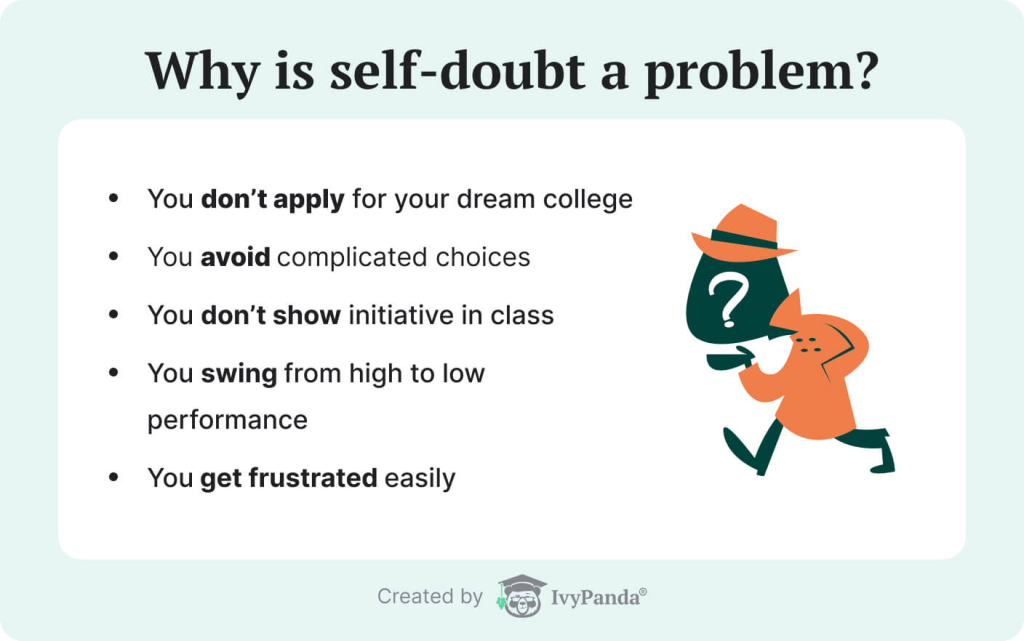
You Don’t Apply for Your Dream College
Have you chosen an unpopular educational institution because it seemed like the right place for someone like you? We’ll ask another question. Who decides which place is right or wrong? Thousands of intelligent students never apply to Harvard because they think only geniuses are admitted. But those who study there are ordinary (although smart) young people with the same troubles as yours!
You Avoid the Preferable but Complicated Choices
Self-doubt can tempt you into a more straightforward solution. You wanted to study medicine but went into social work because it seemed easier. Bad news: getting any degree is complicated and requires persistence. But once you pursue your passion, your dreams can become a reality.
And here’s one more piece of advice:
Always take the most challenging path since you won’t meet many competitors there. Go to graduate school, take the most challenging optional courses, and invite your crush on a date. That’s what people regret not having done when they’re on their deathbeds!
You Don’t Show Initiative in Class
How can a teacher track your progress if you are silent in class? You have to stand up and talk loud and clear to be heard. And you will probably be surprised by how much you have to say.
You Swing from High to Low Academic Performance
The problem here lies in overthinking and perfectionism. You project your self-doubt onto others’ expectations. But self-doubt gives a distorted and unstable image. Your performance rises or drops depending on how good or bad it is at a particular moment.
You Become Easily Frustrated
The consequences here may be destructive. People who struggle with managing their strong emotions often get into unhealthy relationships. In terms of education, this personality feature will try to stop you in your tracks once you’ve messed up for the first time.
But remember:
A successful person is someone who failed and then tried again!
❌ Counterproductive Ways to Deal with Self-Doubt
Your brain may think it knows how to overcome self-doubt. However, some of its unconscious coping mechanisms are counterproductive. In simpler terms, after doing them, you feel worse than before.
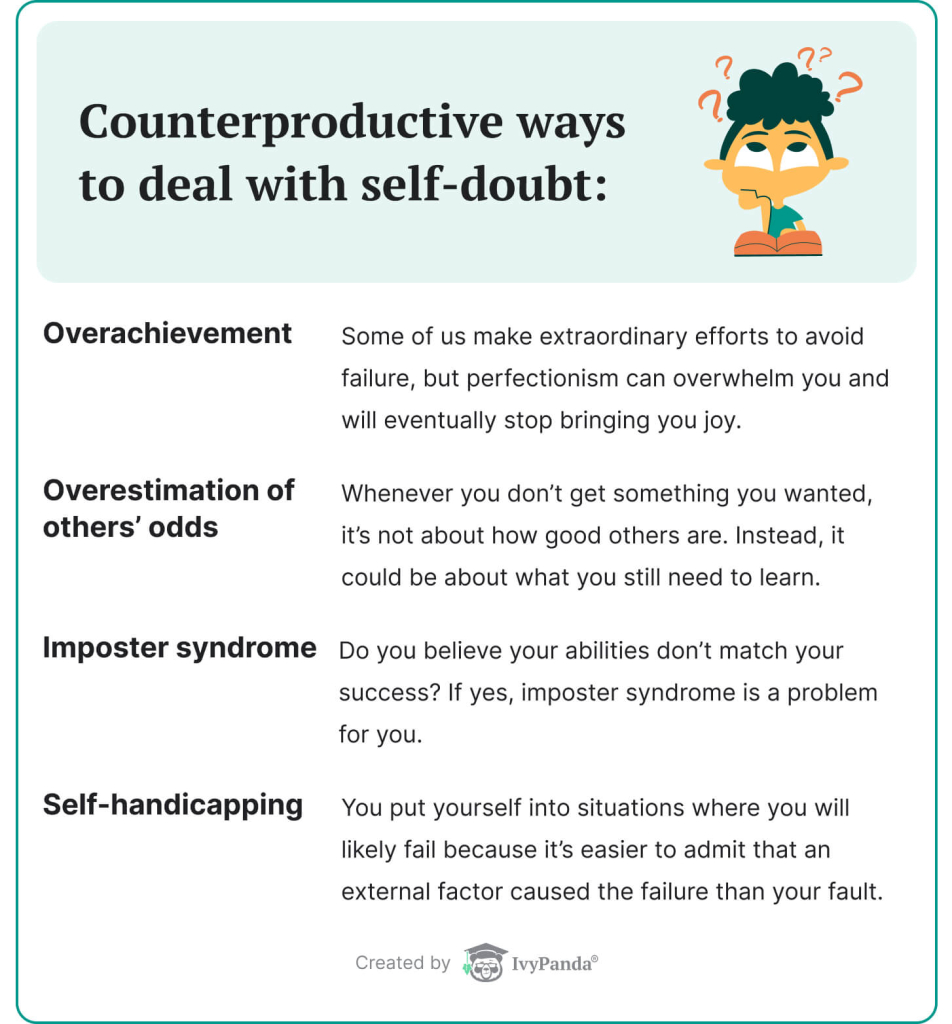
Check out the list below to learn if you indulge in unhealthy default tendencies.
🎈 9 Ways to Overcome Self-Doubt
We have spoken about the roots and implications of the problem.
Here is the most critical part:
How do you stop doubting yourself? We have a couple of tips.
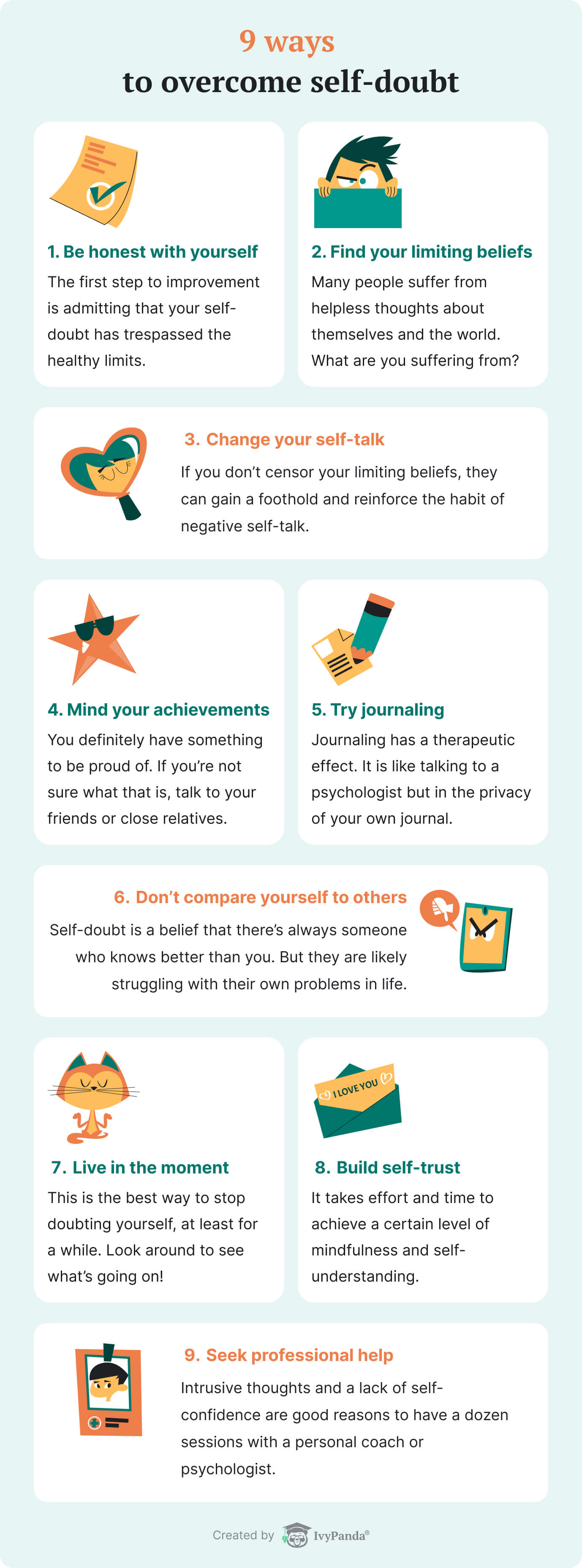
Be Honest with Yourself
Have you identified the situations where you are not honest with yourself? Here’s a brief list:
- You want one thing but do the opposite.
- You complain but keep living as if nothing has happened.
- You defend yourself when someone criticizes you.
The first step to improvement is admitting that your self-doubt has trespassed the healthy limits. Now you know which strategies only make things worse. That’s how you can spot them early on and resist indulging in helpless behavior. The list of counterproductive behaviors is available in the section above.
Find Your Limiting Beliefs
Everyone has them. Have you ever heard someone saying, “I’m not lucky,” whenever something unpleasant happens? People exaggerate their troubles by thinking they are misfortunate or bear some karma from previous generations.
Here are 4 categories of limiting beliefs:
- About the external world:
- All wealthy people were kids of well-to-do parents.
- All the good jobs are already taken.
- There’s no such thing as true love and friendship.
- About other people:
- There are no kind and caring people in the world.
- Other people believe I am a loser.
- Nobody loves me.
- About yourself:
- I’m too old for that kind of fun.
- Who would ever dare to date me?
- Learning foreign languages is naturally not my thing.
- Narcissistic thoughts:
- I am not as stupid as the other girls.
- I know better. They just don’t get me.
- I deserve much more than this job, so why make an effort?
Throw those useless thoughts away. We are too civilized to carry on with magical thinking. The universe does not care if you fail or succeed in class. It’s only you who cares. So do your best to:
Change Your Self-Talk
Having an inner voice is normal for everyone. Psychologists call it self-talk, and that’s something you will have throughout your life. But if you don’t censor your limiting beliefs, they can gain a foothold and reinforce the habit of negative self-talk.
Here are some tips to manage your self-talk:
- Identify your habitual self-talk and find out if it is positive or negative.
- Track how other people in your surroundings talk about themselves. We tend to exchange habits, so watch out!
- Take responsibility for everything that happens in your life. If you got stuck in a traffic jam, why didn’t you leave earlier?
- Abandon certainty that good things will come. Look into the future with an open mind, and don’t get scared of changes.
- Replace negative self-talk with helpful affirmations. We all need comfort and support. If there’s no one around to provide those things, go in for a DIY strategy! Tell yourself what you would like to hear from others.
Don’t Compare Yourself to Others
What is self-doubt? It’s a belief that there’s always someone who knows better than you. But they are most likely struggling with their own problems in life. Everyone does. That’s why comparing your skills and abilities to others is useless.
How to overcome self-doubt by not comparing yourself to others:
Think of Your Past Achievements
You definitely have something to be proud of. If you’re not sure what that is, talk to your friends or close relatives. Ask them what they like the most about you or what they think your strong points are. You will be surprised how different other people see you.
Sometimes people take their achievements for granted. But you have lived your life to this point, and many others would probably like to be in your place. Paying tribute to your past efforts is inspiring. Just try.
Try Journaling
Keeping a journal has a therapeutic effect. It is like talking to a psychologist but in the privacy of your own journal. Write down your intrusive thoughts, analyze their nature (now you know how to do that), and list more positive options for your self-talk.
On the other hand, reading an old journal can show you how much you have achieved and how far you have come. It is a priceless way to compare yourself with the person you were before.
Live in the Moment
Many of us tend to be mentally absent in our current situation, feeling nostalgic for the past or anticipating the future. Living in the moment is the best way to stop doubting yourself, at least for a while.
Here are some tips for doing so.
- Look around to see what’s going on. Close your eyes for a moment, take a deep breath, and open them wide as if you’ve come to watch a long-expected movie. Reality is beautiful, and there’s always something interesting to focus on.
- Do one thing at a time. How often are you having dinner while reading a Facebook thread or watching TV? You might not even notice the taste and texture of food. This disconnection applies to any activity. Be aware of what you are doing.
- Be grateful for what you have. No, we’re not talking about comparing yourself to others. Try to appreciate your efforts and take time to be thankful for life (to yourself, the Universe, God, or whatever you believe in). Very soon, you’ll notice the difference.
Build Self-Trust
Self-trust is the opposite of self-doubt. It takes effort and time to achieve a certain level of mindfulness and self-understanding.
But:
Here are some milestones to try now.
Seek Professional Help
If none of our tips above helps, you probably need to talk to a professional. Intrusive thoughts and a lack of self-confidence are good reasons to have a dozen sessions with a personal coach or psychologist. They know the right strategies to accelerate your development.
Therapy gives us a feeling of being understood. Cognitive-behavioral therapy (CBT) is beneficial for specific issues like self-doubt. Changing habits of problematic thinking toward healthier self-talk will improve your overall well-being.
Thank you for reading this article!
Let’s start down the road of becoming a better version of ourselves. It will be complicated and tricky but very rewarding. We hope this article will be of help in that respect. Please share your experiences and thoughts about self-doubt in the comments below.



